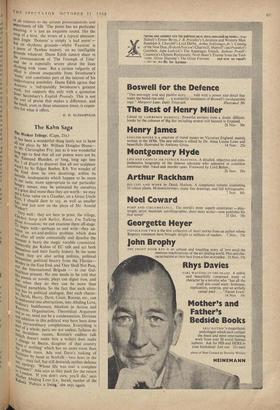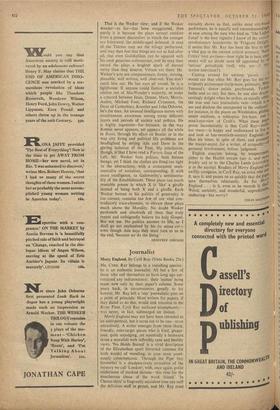a IT has been a wonderful thing lately not to have
all Our plays by Mr. William Douglas Home- Mr. Christopher Fry; just as it was wonderful long ago to find that all our poems were not by r. Edmund Blunden, or long, long ago (see °. I of Blast) to discover that all our sculpture ;Lasn't by Sir Edgar Boehm, RA. Yet wonder of lee kind does its own deceiving; within its aureole, inadequacies which happen to be more I our taste, more appropriate to our particular ,UnrY senses, may be estimated by ourselves ` a great deal more than they are worth: we may Etna, a false value on a Gaudier, on a Great Uncle
Zra,
I should dare to say, as well as smaller ,esk and just now on the plays of Mr. Arnold er? et,V.erY well: they are here in print, the trilogy, 06-teken soup with Barley, Roots, I'm Talking °Ift Jerusalem; we can examine them off-stage. 1,;' begin with—perhaps to end with—they ad- ee an art-and-politics problem which does not after all smile contentedly and dissolve the oel0ent it hears the magic vocable committed. tkIIIWardly the Kahns of EC talk and act both .1;lernselves and their family history. In the same humanities, they are also acting politics, political trlanities, political history from the Thirties- a„?,sleY in the East End, and They Shall Not Pass, 13"‘i. the International Brigade — to our Gal- Itkraithiao present. No one needs to be told that the Poems or novels, plays can digest iron, and political when they do they can be more than pamphlets. So the fact that each situa- te°,,a „has its political analogue, that each charac- 2 arah, Harry, Dave, Cissie, Ronnie, etc., can undressed into abstractions, into Abiding Love, ordinary Indifference, Idealism in Action and Reaction, Organisation, Theoretical Argument and so on, need not be a condemnation. Division wit in this political way have been done Pa" extraordinary completeness. Everything is nor ,t 0,f a whole, parts are not useless, failures do (wht Invalidate causes, Ronnie's endless talk 4 "Lleh doesn't make him a writer) does make ions in Beatie, daughter of that country the 0' nothing' which has no more roots than ,.Fenc urban mass. Ada and Dave's making of iture by hand in Norfolk—`two Jews in the lios may fail, but still demands neither defence start apology. 'Whose life was ever a complete to teloent?' Ada says as they pack for the return Mo`,,Oodon. 'If you don't care, you'll die,' says kakuler Abiding Love (i.e., Sarah, mother of the uos). 'Politics is living,' she says again. That is the Wesker view; and if the Wesker wonder—so far—has been exaggerated, then partly it is because the plays extract comfort from a present discomfort in which the younger are frustrated, the middle-aged defeated. A man of. the Thirties may see the trilogy performed, and may then feel that things are not so bad after all, that even Gaitskellism can be squared with his once generous communism, and he may then award the plays a brighter spark of eternal verity than they deserve. Virtues are there. Mr. Wesker's acts are compassionate, funny, moving, plausible, well written, well observed. You don't catch him out. He has eyes all round, he is a lighthouse. If anyone could fashion a socialist chalice out of MacWonder's majority, or make a concord between Jesus, Donne, Marx, Morris, Auden, Michael Foot, Richard Crossman, the Dean of Canterbury, Koestler and John Osborne, he's the man. An unusual intelligence moves with simultaneous awareness among many different layers and periods of society and politics. He is highly ingcnious—for instance, in the way Ronnie never appears, yet appears all the while in Roots, through his effect on Beatie; or in the way city living and political life problems are headlighted by setting Ada and Dave in the glaring isolation of the Fens. My conclusion, though, is that I have read a Forsyte Saga of the Left. Mr. Wesker feels politics, feels human beings; yet I think the clothes are fitted too tight to the abstractions, with a consequent senti- mentality of socialism, corresponding, if with more intelligence, to Galsworthy's sentimenta- lity of the Establishment. These plays too much resemble poems in which X is 'like' a giraffe instead of being both X and a giraffe. Each Wesker human in his politics of generosity is too correct, contains too few of our vital con- tradictory trace-elements, to elevate these plays much above the Morality. No doubt Wesker pardoneth and absolveth all them that truly repent and unfeignedly believe his holy Gospel. But not me. No politics amount to life, so I shall go out unabsolved by his Ite missa est- even though Ada says they must turn to us in the end, 'because we do the living.'
GEOFFREY GRIGSON



















































 Previous page
Previous page